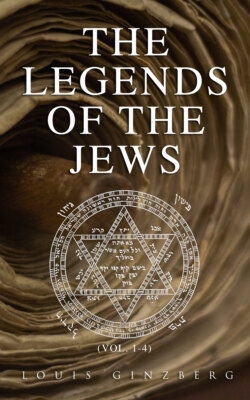Читать книгу The Legends of the Jews (Vol. 1-4) - Louis Ginzberg Ginzberg - Страница 84
На сайте Литреса книга снята с продажи.
ISHMAEL CAST OFF
ОглавлениеWhen Isaac grew up, quarrels broke out between him and Ishmael, on account of the rights of the first-born. Ishmael insisted he should receive a double portion of the inheritance after the death of Abraham, and Isaac should receive only one portion. Ishmael, who had been accustomed from his youth to use the bow and arrow, was in the habit of aiming his missiles in the direction of Isaac, saying at the same time that he was but jesting. Sarah, however, insisted that Abraham make over to Isaac all he owned, that no disputes might arise after his death, "for," she said, "Ishmael is not worthy of being heir with my son, nor with a man like Isaac, and certainly not with my son Isaac." Furthermore, Sarah insisted that Abraham divorce himself from Hagar, the mother of Ishmael, and send away the woman and her son, so that there be naught in common between them and her own son, either in this world or in the future world.
Of all the trials Abraham had to undergo, none was so hard to bear as this, for it grieved him sorely to separate himself from his son. God appeared to him in the following night, and said to him: "Abraham, knowest thou not that Sarah was appointed to be thy wife from her mother's womb? She is thy companion and the wife of thy youth, and I named not Hagar as thy wife, nor Sarah as thy bondwoman. What Sarah spoke unto thee was naught but truth, and let it not be grievous in thy sight because of the lad, and because of thy bondwoman." The next morning Abraham rose up early, gave Hagar her bill of divorcement, and sent her away with her son, first binding a rope about her loins that all might see she was a bondwoman.
The evil glance cast upon her stepson by Sarah made him sick and feverish, so that Hagar had to carry him, grown-up as he was. In his fever he drank often of the water in the bottle given her by Abraham as she left his house, and the water was quickly spent. That she might not look upon the death of her child, Hagar cast Ishmael under the willow shrubs growing on the selfsame spot whereon the angels had once spoken with her and made known to her that she would bear a son. In the bitterness of her heart, she spoke to God, and said, "Yesterday Thou didst say to me, I will greatly multiply thy seed, that it shall not be numbered for multitude, and to-day my son dies of thirst." Ishmael himself cried unto God, and his prayer and the merits of Abraham brought them help in their need, though the angels appeared against Ishmael before God. They said, "Wilt Thou cause a well of water to spring up for him whose descendants will let Thy children of Israel perish with thirst?" But God replied, and said, "What is Ishmael at this moment—righteous or wicked?" and when the angels called him righteous, God continued, "I treat man according to his deserts at each moment."
At that moment Ishmael was pious indeed, for he was praying to God in the following words: "O Lord of the world! If it be Thy will that I shall perish, then let me die in some other way, not by thirst, for the tortures of thirst are great beyond all others." Hagar, instead of praying to God, addressed her supplications to the idols of her youth. The prayer of Ishmael was acceptable before God, and He bade Miriam's well spring up, the well created in the twilight of the sixth day of creation. Even after this miracle Hagar's faith was no stronger than before. She filled the bottle with water, because she feared it might again be spent, and no other would be nigh. Thereupon she journeyed to Egypt with her son, for "Throw the stick into the air as thou wilt, it will always land on its point." Hagar had come from Egypt, and to Egypt she returned, to choose a wife for her son.
